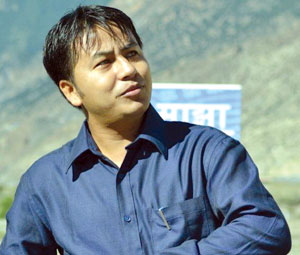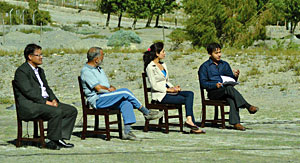 |
When Narayan Shrestha of Sajha Sawal radio discussion program goes anywhere in Nepal these days, people throng the venue just to catch a glimpse of the dapper presenter. It just goes to show how popular radio is in Nepal and reflects approval for the way in which Shrestha afflicts the powerful.
Friday, 16 September marks the 200th episode of the immensely popular Sajha Sawal radio discussion program that has been broadcasting continuously since 2007 on the BBC Nepali Service.
"It was hard to get people to ask questions initially," Shrestha admitted in an interview with Nepali Times this week, "they mostly gave suggestions. We had to run an orientation on how to ask questions." Four years later, the program's format has become famous for sharp and hard-hitting exchanges between public figures on the stage and a citizen audience.
Imitation being the best form of flattery, Sajha Sawal has spawned a whole lot of similar radio and tv discussion programs. But when it started four years ago, it was a revolutionary format for radio and TV in Nepal: common people asking questions to a panel of invitees which included political leaders, bureaucrats and experts.
"Our idea initially was to involve the common people's voice in constitution making and peace process," Shrestha says, but as the program started traveling across the country the discussions soon ranged from agriculture, foreign employment, local development and infrastructure.
 |
But ultimately, Shrestha says, the public's concern is not with the nitty-gritty of politics or tedious theorising by civil society stalwarts but with day-to-day survival issues. "They just want the politics to get in order so that they can get by," Shrestha says. "People are concerned more about availability of seeds, fertilisers, jobs, better schools for their children and health facilities."
One of the most memorable episodes on Sajha Sawal was with horticulturalist Kedar Budhathoki who developed a unique wilt-resistant, high yielding variety of tomato called Srijana. The program which was shot in Budhathoki's farm elicited a wave of enthusiasm among Nepalis.
"Even till today we get at least one call a week inquiring about Budhathoki's super tomatoes," Shrestha says.
Besides listeners nationwide who listen to the BBC Nepali Service, Sajha Sawal registers 7,000 hits a week in the BBC Nepali's website and is popular among the Nepali diaspora. The program also travelled to the UK and US where issues concerning overseas Nepalis were also discussed.
Read also:
The new radio revolution, RUBEENA MAHATO
Karnali community, HARIDEVI ROKAYA in JUMLA


